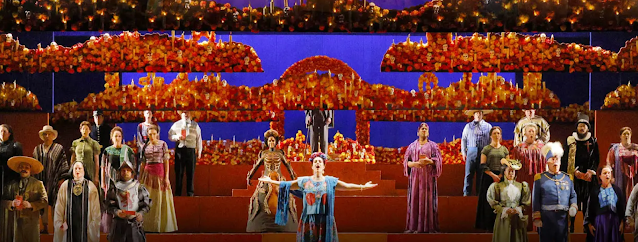Opera Review: El Último Sueño de Frida y Diego.
Michael Sedano
 |
| foto: L.A. Opera |
I was mildly disappointed not attending the L.A. Opera’s production of Mozart’s Don Giovanni last month. Happily, I can make up for the lapse with another don Juan, the notorious mujeriego pot-bellied Diego Rivera in the Los Angeles Opera’s El Último Sueño de Frida y Diego.
A far cry from Mozart,Grammy Award-winning composer Gabriela Lena Frank and Pulitzer Prize-winning playwright Nilo Cruz put together an experience worthy of any other Grand Opera on the nation’s premiere stage for opera, but with the taste of raza and lo nuestro. Gente paid attention and throng to the production. I would not be surprised to see the run extended prior to moving up North to The City.
Credit for the look and feel of the stage experience goes to Stage director Lorena Maza, scenic designer Jorge Ballina, costume designer Eloise Kazan and lighting designer Victor Zapatero, all of whom son chilangos. The choreographer is Ruby Tagle, also based in Mexico City. Jeremy Frank is the chorus director.
Frida.
Diego.
Audiences.
Especially in L.A., say the magic words “Frida” “Diego” and with the snap of credit card plastic on the counter, gente fill the plaza of the Music Center rubbing shoulders with delighted opera regulars. Those People welcome Diversity to dispel the fusty fuddy-duddy reputation of opera-goers and Grand Opera.
Órale, El Último Sueño de Frida y Diego is Grand Opera, and our gente flocked to the magic.
Welcome to the mainstream, raza. El Último Sueño marks all manner of innovative and unique highpoints in United Statesian High Culture. The best part, this becomes the first time many people have ventured this far into the cultural heart of Anglo L.A. Aquí estamos que no?
Programmers at the Music Center get it right. Tickets start at fourteen bolas. If you ride the train you can walk there.
At the front doors, there’s a large gold frame for selfies with a muted blue lienzo flat emblazoned with trademark logoi. People line up fifty deep for a few seconds enchanted, framed inside el marco de oro.
 |
| foto: Irene Hernandez L, Irene Hernandez, R, Helen Suquett- Krolik |
The selfie set evokes the most magical vignette in the magical production inside: identical gold frames enfold tableaux vivants quoting classic Kahlo paintings. Only after seeing the scene will the selfie-taker realize the fulness of their interaction with the experience.
The musical score provides an aural tapestry that seems fit to the emotions of the moment. No one left the theatre humming the catchy tunes because there aren't any. I was expecting a "La Llorona" melody somewhere in the "folklore-inspired score" but I recognized nothing evocative of stuff I know. Maybe Carlos Chavez devotées would recognize the notes, but it doesn't have to sound familiar to be effective. The music works and drives the action onward.
Úlitmo Sueño is easily the first purely cultura Mexicana libretto to play on Bunker Hill. The Opera association's literature proclaims the All-Mexican creative staff and have bent over backwards to make this an L.A. event wrapped in Mexicanismo.
It's an opportunity raza really should jump into with both jobs and a loan from the readycash place. Even at fourteen bucks a seat, attending the opera is not for the faint of heart. The lobby bars take a C-note for four drinks.
Eat before you go. But go. Mejor, save your bucks and make an event of going to the Opera, with friends. "Grand" means something, so be grande and enjoy the opera a todo dar.
There's magic on that huge stage. Mictlán. Real Life. An orchestra directed by Lina González-Granados provides the symphonic musica. Voices include a sizeable chorus, leads include Soprano, Mezzo-soprano, Countertenor, Baritone. No amplification, it's real Opera.
Gente generally don't know all the technical stuff about the opera nor this one in particular. We're here to experience.
 |
| foto:L.A. Opera |
| Michael Sedano photobombs two visitors after the matinee. Attending the performance infuses the audience with joy and a giddiness born of sharing a magical experience. |
El Último Sueño de Frida y Diego has only six Los Angeles performances, 7:30 or 2:00 p.m., through December 9 via this link to L.A. Opera.


Thank you, Michael, for this "local color" tour of the iconic Dorothy Chandler Pavilion; its vibrant opera ambience; the unprecedented Latino presence and engagement at this event; and, most important, the historical significance of this Ultimo Sueno ...which hopefully is just the beginning Sueno of more Spanish-language American operas.
ReplyDelete